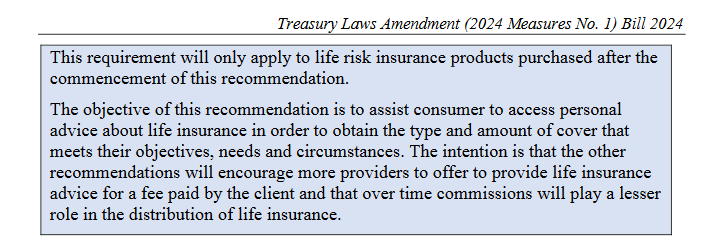The news that the retention of risk commissions is included in the draft legislation delivering the first tranche of the QoA Review recommendations drew strong reader interest this week…
The retention of risk commissions at current levels is included in the draft legislation delivering the first tranche of the QoA Review recommendations.
The Delivering Better Financial Outcomes package of reforms, which has been released for consultation on Treasury’s website this week, includes the QoA Review Recommendation, 13.7 on life insurance.
This recommends retaining “..the exception to the ban on conflicted remuneration for benefits given in connection… with the sale of a life risk insurance product,” adding that commission and clawback rates should be maintained at current levels (see: QoA Review Decisions – Risk Commissions Retained).
In welcoming the draft legislation, FAAA chief Sarah Abood, notes that a piece of important news “…is confirmation that commissions on life insurance …can continue to be paid to advisers, with a one-off written consent from the client before the beginning of the policy.”
In the Exposure Draft Explanatory Materials attached to the draft legislation the Government notes the objective of Recommendation 13.7 is to assist consumers to access personal advice about life insurance in order to obtain the type and amount of cover that meets their objectives, needs and circumstances. Interestingly, it adds:
…over time commissions will play a lesser role
“The intention is that the other recommendations will encourage more providers to offer to provide life insurance advice for a fee paid by the client and that over time commissions will play a lesser role in the distribution of life insurance.”

The Treasury outlines that the draft legislation it has just released responds to several recommendations of the QoA Review, including:
- Recommendation 7: Clarifying the legal basis for superannuation trustees reimbursing a member’s financial advice fees from their superannuation account, and associated tax consequences
- Recommendation 8: Streamlining ongoing fee renewal and consent requirements and removing the requirement to provide a fee disclosure statement
- Recommendation 10: Providing more flexibility on how FSG requirements can be met
- Simplifying and clarifying the provisions governing conflicted remuneration, including:
- Recommendations 13.1 and 13.3: Clarifying that monetary or non-monetary benefits given by a client are not conflicted remuneration along with the removal of consequential exceptions
- Recommendation 13.4: Removing the exception to conflicted remuneration rules for the issue of financial products where advice has not been provided in the previous 12 months
- Recommendation 13.5: Removing the exception to conflicted remuneration rules for agents or employees of Australian ADIs
- Recommendation 13.2: Introducing a specific exception to the conflicted remuneration provisions that permits a superannuation fund trustee to pay a fee for personal advice where the client requests the trustee to pay the fee from their superannuation account
- Recommendations 13.7 to 13.9: Introducing new standardised consent requirements for life risk insurance, general insurance and consumer credit insurance commissions
FAAA
The FAAA notes it is pleased that the recommendation on ongoing fee arrangements and consent requirements is to be included in the draft legislation.
Abood says this recommendation “..is to consolidate ongoing fee consent requirements to a single standard “consent form”. Delivering on this recommendation will save many hours of frustrating, inefficient and unnecessary work for both advisers and their clients and we are very happy to see this included in the first tranche of legislation.”
…the association is concerned that the rationalisation of SoA and the removal of safe harbour steps from the best interests duty have not been included, at this time…
However the association is concerned that the rationalisation of Statements of Advice and the removal of safe harbour steps from the best interests duty have not been included in the draft legislation at this time.
“These are important elements in cutting unnecessary red tape and have the potential to meaningfully reduce the cost of providing advice. We will be seeking further clarification from the Government on the timeframe for these measures.”
She adds that the recommendation that clients be required to give informed consent to be treated as wholesale clients “…has not been addressed at this stage. It may be awaiting the outcomes of the recent MIS review.”
Meanwhile FSC CEO, Blake Briggs says the Government’s release of exposure draft legislation “…is a down payment on their commitment to make financial advice more affordable and accessible…”
He says the first tranche of legislation “…contains a modest but important package of reforms that will start to simplify the regulatory framework without reducing consumer protections, and has the support of the financial services industry.”
“This modest package of changes is just the start, however, to ultimately reduce the cost of providing financial advice…”
He too notes that Government has held over key recommendations including abolishing the safe harbour steps and simplifying SoA, “…in favour of consultation under ‘phase two’ of its process, which focuses on retirement advice.”
“It is a missed opportunity to have deferred implementing key recommendations on abolishing the safe harbour steps and simplifying SoA, which would achieve the most in reducing the regulatory cost burden on financial advice.”
He adds however that the FSC is pleased the Assistant Treasurer has offered a clear commitment to have a finalised Government policy position on SoAs and abolishing the safe harbour steps before the end of the year.







They can “enshrine” everything including their mothers fluffy pink slippers until the cows come home but until they INCREASE commissions to a truly sustainable level absolutely nothing will change in the slide to life company extinction in Australia.
Needed is 100% upfront, 20% trails and 1 year responsibility period. Yes, 100% is higher than the previous 80% from years ago but there’s also a lot more compliance, inferior products to navigate from a compliance viewpoint and generally more nonsense and red tape to jump. This takes more time and more so stresses advisers.
Anything less than 100/20 + 1 year clawback is simply deck chairs on the Titanic. Blind Freddy should be able to see this by now! Advisers won’t waste their time and risk their companies in compliance loop holes for the pittance of 60/20 and 2 year responsibility. When oh when are life companies going to get real, smell the coffee and rally with your advisers for this? – do something NOW or see your own demise . . . soon!
Comments are closed.